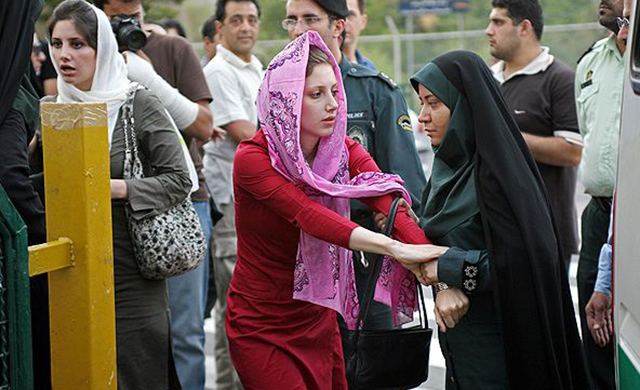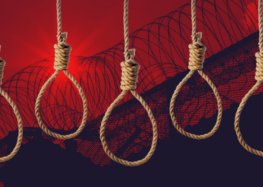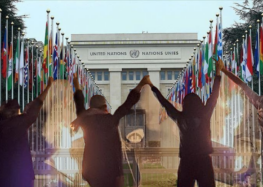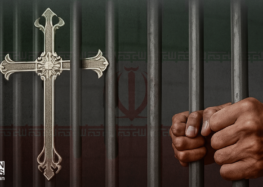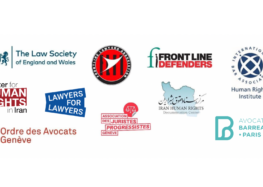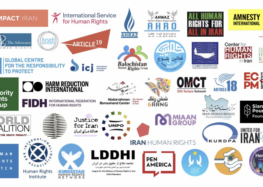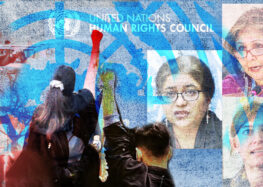Iranian Women Do Not Have the Right to Control Their Bodies
Since President Hassan Rouhani assumed office in August 2013, there has been a marked increase in state policies by hardliners in the government directly infringing upon the most basic rights of Iranian women. These hardliners, who dominate Parliament and are ensconced in the security, intelligence, and judicial branches of government, have focused in particular on two issues, both of which concern women’s bodies: the observance of “proper” hijab (Islamic dress) and the availability of family planning and women’s reproductive health services.
Iranian women’s observance of “proper” hijab has been a focus of concern for the Iranian government in general and hardliners in particular since the 1979 Revolution. Indeed, hijab is one of the ideological pillars of the Islamic Republic of Iran, alongside its anti-American and anti-Israel sentiments. It was only one month after the Revolution, in March 1979, that the Islamic Republic’s founder, Ayatollah Khomeini, made hijab compulsory for all Iranian women. Khomeini’s order, which faced protests by thousands of women, was uniformly enforced within three years.
When the centrist Hassan Rouhani won office last year by a large electoral margin, hardliners, anxious to assert their continued primacy in the domestic sphere, unleashed a wave of attacks on women with “loose” hijab, citing the “immorality” and “lack of chastity” of such women and their participation in a “western plot” to corrupt Iranian youth.
In June 2014, conservative MPs summoned the Iranian Minister of Interior Affairs, Abdol Rahman Fazli for parliamentary hearings to question why the ministry did not take “appropriate actions” to confront women who wear leggings. While the photos of women in leggings were screened in Parliament on large monitors, Iranian MPs asked the minister to confront these “aberrations” more strictly.
A few weeks ago, Abdolhamid Mohtasham, head of Ansar-e Hezbollah, announced the launch of a street campaign to confront women who don’t observe “proper” Islamic hijab. Ansar, a hardline militia group connected to the Revolutionary Guards and the Basij militias, is infamous for its role in suppressing popular anti-government student demonstrations and attacking reformist newspapers and journalists in the 1990s and the 2000s. The group, which usually operates without official government authorization and expresses direct loyalty to Supreme Leader Ali Khamenei, claims that they are the true protectors of Islamic values in society.
According to official statistics, during last year 2,917,000 women have been warned for their hijab by morality police, from which 205,052 were forced to sign a written statement promising not to violate the hijab law in the future, and 18,082 were referred to the Judiciary to be tried in courts. Moreover, there were numerous additional hijab “interventions” by other non-governmental organizations, such as the Basij militia and its affiliated groups, but there are no reliable statistics regarding their number.
Hijab enforcement actions are not limited to warnings by the morality police and daily arrests. Based on a report published in March 2014 by Justice for Iran, a human rights organization in London, Iranian women undergo various forms of harassment, abuse, and discrimination by authorities on a daily basis for not observing “proper” hijab. The report demonstrates that many Iranian women face “limitations and deprivations in relation to their careers, education, public services, and participation in cultural or recreational spaces,” if they violate hijab laws.
Hijab, though, is not the only focus of hardliners’ attempts to control the lives—and bodies—of Iranian women. Recently, women have been at the center of another governmental initiative: In the last few months, the hardline-dominated Iranian Parliament has been working on a national plan that restricts women’s access to contraception and limits their reproductive rights.
If the bill is ratified, Iranian women will lose access to free birth control and reproductive health care. This is a dramatic change from state policy in the 1990s, when the Iranian government implemented a national family planning project. Family planning was a rational solution to the problem of a population boom in the first decade after the 1979 Revolution, and it led to the reduction of the population growth rate from 3.2 in 1986 to 1.29 in 2010. According to the United Nations, it was one of the most successful population policies in the world.
However, the current Supreme Leader Ali Khamenei had a different opinion. In October 2012, he called the family planning project a mistake and called instead for population growth. Following Khamenei’s decree, the conservative government of Mahmoud Ahmadinejad (2005-2013) cut the birth control budget and the Iranian Parliament started the legislation process to implement Khamenei’s edict.
The current population growth bill would significantly affect the lives of millions of Iranian women, especially those from the lower strata of society. Eliminating access to reproductive health care would leave vulnerable women to struggle with frequent pregnancies, more children, and unsafe abortions. It also effectively deprives them of education and full participation in the job market. Due to the underdeveloped economy, discriminatory laws, and cultural barriers, Iranian women’s share of the job market is only 13%; the population growth bill would lower it further.
By imposing their view of proper hijab and reducing women’s access to reproductive care, these authorities are effectively excluding women from full participation in society and relegating them to their homes. These policies are an explicit violation of women’s basic rights and a clear indication that Iranian women are increasingly losing control over their own bodies.
President Rouhani promised repeatedly during his campaign to uphold the rights of women. He stated, on April 20, 2014 at an official gathering in Tehran on the occasion of Mother’s Day and Women’s Day in Iran, “It is not possible to push 50% of society into isolation or marginalize them. Women should have equal opportunity, equal protections and equal social rights.”
Yet Rouhani has not delivered on these pledges. To date he has remained focused on foreign affairs, and has left domestic matters largely in the hands of hardliners who seek further restrictions on women’s social, economic, and political participation. Rouhani’s administration has neither pushed back against these initiatives, nor introduced policies to improve the state of women’s rights in Iran. In light of these direct assaults on women’s most basic rights—the right to control their own bodies—the Rouhani administration must end the impunity with which hardliners have advanced their misogynistic projects, and stand with Iranian women to protect their rights.
*Leila Mouri is an Iranian women’s rights activist and journalist

